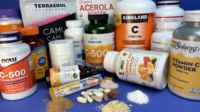
Answer:
Several supplements have been shown to be helpful for gum disease and/or periodontitis -- the inflammation around the teeth causing pocketing. Taken orally, the omega-3 fatty acid DHA (from algal oil) and the omega-6 fatty acid GLA have been found to improve outcomes in people with periodontitis.
Several small studies also suggest that lycopene may be helpful. For example, one study found that in people with gum disease, 8 mg of lycopene (LycoRed) taken twice daily for two weeks significantly reduced measures of the disease compared to a placebo (Chandra, Oral Health Prev Dent 2007). The same dose of lycopene taken for 2 months was found in another study to reduce plaque, bleeding and signs of gum disease compared to placebo among people with periodontitis who were also treated with a cleaning treatment (Quintessence Int 2013).
A probiotic lozenge has also been found to be helpful for people with moderate to severe periodontitis.
Rinsing with brewed green tea may help to reduce plaque-causing bacteria. In people with mild to moderate chronic periodontitis, brushing with a paste containing green tea was reported in one study to significantly reduce plaque, bleeding, clinical attachment levels (a measure of the risk of losing a tooth) compared to people who brushed with a fluoride and antibacterial paste (Hrishi, Int J Den Hyg 2015).
A small study in healthy adults found that rinsing with a cranberry mouthwash (containing 0.6% cranberry extract) twice daily for 2 weeks reduced the amount of plaque-causing bacteria as well as a chlorhexidine mouthwash (an antibacterial rinse often used to treat gum disease); bacteria was reduced by 68% and 69%, respectively (Khairnar, Contemp Clin Dent 2015).
Vitamin C is certainly necessary for healthy gums and teeth (deficiency causes scurvy), but few people are deficient in vitamin C and it's not clear if additional supplementation is helpful. One study found that increasing vitamin C levels by consuming 2 grapefruits per day significantly reduced bleeding in non-smokers with periodontitis (Staudte, Dr Dent J 2005). However, another study reported that daily supplementation with vitamin C increased blood antioxidant levels in people with periodontitis (levels of which may be lower in people with this condition) but did not provide any additional benefit in treatment outcomes (Sulaiman, J Periodontol 2010).
CoQ10, both topical and oral, is sometimes promoted for gum health, although the evidence is limited. One small study reported a benefit with the application of CoQ10 gel (PerioQ) in addition to non-surgical cleaning treatment, compared to treatment alone (Sale, J Indian Soc Periodontol 2014).
Vitamin D deficiency has been linked with gum disease in some, but not all, observational studies. Correcting vitamin D deficiency prior to starting treatment for severe gum disease may improve response to treatment in some people, although more research is needed to confirm this benefit.
One study suggested that zinc supplementation provided added benefit to standard dental treatment to reduce gum inflammation and bleeding in people with moderate to severe gum disease (Gupta, J Oral Biol Craniofac Res 2025).
Also see our article about choosing the best toothpaste and mouthwash, which includes our Top Pick toothpaste and mouthwash for bleeding gums.
Join today to unlock all member benefits including full access to all CL Answers and over 1,400 reviews.
Join NowAlready a member? Sign In Here.
Join now at www.consumerlab.com/join/













Submit your comment
This feature is restricted to active members.
Join now to add comments and get all member benefits, including over 1,400 reviews.
Join NowAlready a member? Sign in here.